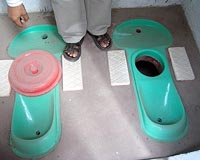| . |  |
. |
Taipei (AFP) Aug 23, 2009 Taiwan's leader arrived at Hsiaolin to comfort typhoon survivors but instead was confronted by angry villagers who alleged that a massive government water project had contributed to mudslides which killed hundreds. The southern village of Hsiaolin, a symbol of Typhoon Morakot's devastation, has opened a new front in the political storm facing President Ma Ying-jeou with charges that the project made the mudslides more deadly. Ma has vowed to investigate claims that dynamite blasting to carve a 15-kilometre (10-mile) channel from the Laonung River to the Tsengwen Dam caused erosion that endangered the valley village. An official probe into the project was launched almost two weeks after the typhoon hit while the head of the Water Resources Agency has offered to resign in response to the villagers' increasingly vocal protests. "The mountains have been loosened after they were bombed for years day and night. Previously, we had never had such a disaster. Therefore we've good reason to believe that is to blame," Aliao, chief of the nearby Mintzu village, told AFP. "We have protested since the very beginning, but they just didn't listen." Television footage showed survivors confronting Ma this week when he came to Hsiaolin, a picturesque mountain village now buried in mud five-storeys deep, where about 400 people were missing, feared dead. "It was stupid. The government bombed the mountains and destroyed them. This policy was definitely wrong," one villager shouted at Ma. "Wrong policies are even more terrible than corruption," he said in an apparent reference to Ma's predecessor Chen Shui-bian, who has been detained on graft charges. The president has repeatedly assured the villagers that his government would take their concerns over the water project seriously. "We will thoroughly investigate the matter even though the project didn't start in my term," he told a group of protesters outside a memorial service in Hsiaolin on Saturday. "President Ma you must stop the project," a protester pleaded, while others held banners reading "Water project ruins homeland." Public prosecutors on Thursday began examining the site at Hsiaolin, interviewing local government and river affairs officials and collecting before-and-after aerial photos of the area. "After such a grave disaster, it's our duty to find out the truth and return the due justice to the dead," prosecutor Chuang Jung-sung told reporters. But observers say it will not be easy to determine who is at fault. "The project was initiated by previous governments but Ma's government was accused of speeding it up so it is more complicated to determinate the responsibility," said Hsu Yung-ming, a political analyst at Soochow University. Ma took office in May last year after a resounding victory over the Democratic Progressive Party (DPP) which has been embroiled in corruption scandals implicating Chen and other top officials. Work on the 21.2 billion Taiwan dollar- (646 million US dollar-) project started in 2005 under the DPP and was scheduled to be completed by 2012. Its aim is to divert water from the Laonung River, which rises during the heavy monsoon rains, into the Tsengwen reservoir before it can flow into the ocean. Chen Shen-hsien, head of the Water Resources Agency, has insisted that work on the channel had nothing to do with the deadly mudslides. "The allegation that the project is responsible for the huge loss of hundreds of lives is too much for us," he said, adding the project, a tunnel cutting through several mountains, was 11 kilometres away from Hsiaolin. If the project is found to have aggravated the landslides, it would be an extreme case of mega water projects harming the communities they were meant to help, but experts warn such cases are not isolated. The number of large water transfer projects is on track to nearly triple by 2020 and the amount of water transferred expected to double, the WWF conservation group said in an international study published this past week. Most of the giant projects are proceeding without adequate scrutiny of economic, environmental and social impacts, the WWF warned. "Poorly assessed mega transfers have the potential to inflict immense harm," wrote Martin Greiger, the WWF's Germany freshwater director. Share This Article With Planet Earth
Related Links Water News - Science, Technology and Politics
 To save lives, an Indian doctor rethinks the toilet
To save lives, an Indian doctor rethinks the toiletStockholm (AFP) Aug 23, 2009 By rethinking the humble toilet, Indian sanitation expert Bindeshwar Pathak has found a way that can save water -- and lives -- in developing countries. For four decades, His Sulabh Sanitation Movement has equipped more than 1.2 million households with eco-friendly toilets and installed 7,500 public lavatories across India. Yet almost three out of four Indians, or around 700 millionpeop ... read more |
|
| The content herein, unless otherwise known to be public domain, are Copyright 1995-2009 - SpaceDaily. AFP and UPI Wire Stories are copyright Agence France-Presse and United Press International. ESA Portal Reports are copyright European Space Agency. All NASA sourced material is public domain. Additional copyrights may apply in whole or part to other bona fide parties. Advertising does not imply endorsement,agreement or approval of any opinions, statements or information provided by SpaceDaily on any Web page published or hosted by SpaceDaily. Privacy Statement |